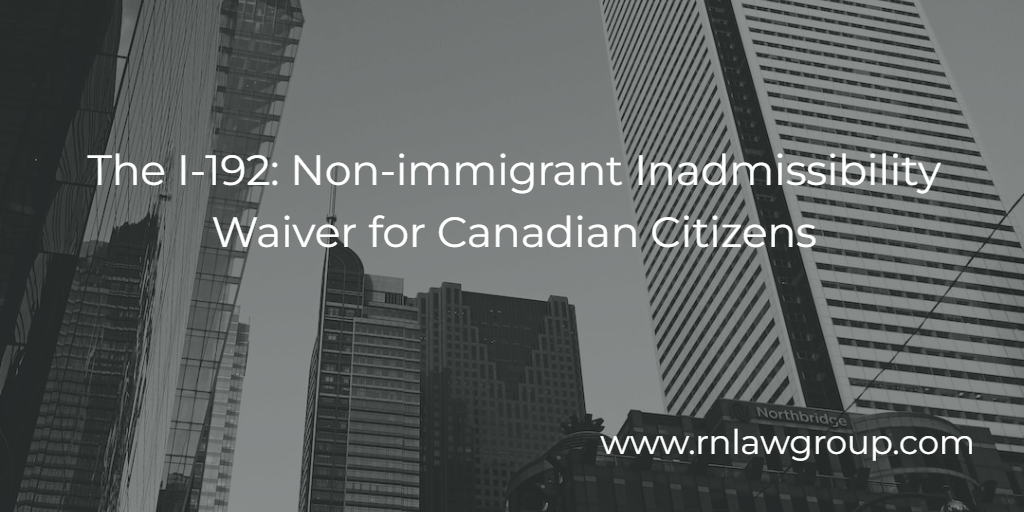
The I-192: Non-immigrant Inadmissibility Waiver for Canadian Citizens
Canadian citizens are visa-exempt and are not required to get a visa at a US Consulate before entering the United States. While various visa categories have different requirements, such as an H-1B requiring an approval from USCIS, Canadian citizens can apply for entry directly at the port of entry (POE). In some instances, a Canadian citizen may have been previously found inadmissible for various reasons: https://www.rnlawgroup.com/an-overview-of-various-grounds-for-inadmissibility/. Since Canadians do not have to apply for a visa at the consulate, they generally do not follow the typical Hranka waiver process for nonimmigrant visas: https://www.rnlawgroup.com/the-nonimmigrant-waiver/. Despite this, there are still procedural mechanisms for a Canadian citizen to obtain a non-immigrant inadmissibility waiver.
Instead of applying at the consulate, Canadian citizens would apply directly at the POE using a form I-192. Before going into details on the I-192, it is worth noting two major “procedural” aspects. First, not all ports of entry accept form I-192s, and the list can be found here: https://www.cbp.gov/travel/international-visitors/admission-forms/form-i-192-form-i-212-and-form-i-824-designated-ports-entry (last accessed Dec. 6, 2022). Second, CBP now allows individuals to apply for an I-192 while they are within the United States. This can be helpful given the long processing times of the I-192.
The I-192 waiver can be used for almost all grounds of inadmissibility with the exceptions of national security reasons. This is the form used for the 212(d)(3) waiver. To apply for a waiver as a Canadian, an individual will take the form I-192, the required fees, the mandatory specific supporting documentation, and any evidence they are submitting to support their position. The required documentation includes:
- Evidence of citizenship
- Completed Form I-192 signed
- G-28 if you are represented by an attorney
- US fingerprint card FD-258 or electronically captured fingerprints that will be completed by a CBP officer
- Various specific evidence based on the type of inadmissibility
When you are applying for the waiver, you packet should include a brief detailing the factors that qualify you for the waiver. For example, under Matter of Hranka, the BIA created a three prong test to determine if a waiver should be granted.
- The risk of harm to society if the applicant is admitted;
- The seriousness of the applicant’s prior immigration law, or criminal law, violations, if any; and
- The nature of the applicant’s reasons for wishing to enter the United States.
Procedurally, the individual will take the waiver packet, do biometrics, and bring the documents to the POE. From there, the CBP officer will forward everything to the Admissibility Review Office (ARO). The ARO is the sole adjudicator of 212(d)(3) waivers. Processing times are long, but the ARO has a goal of 150 days. Notably, they are not close to that.
These waivers may be issued for a maximum period of five years. The approval will come on an I-194, and will list the permissible reasons that the waiver recipient may enter the US. You cannot enter the US if it is not for a reason listed on the I-194. For example, it might list “business or pleasure” or just “pleasure.” It is important to list the reasons you are seeking the waiver on your application as you will not be allowed to enter unless you do another waiver.
If you are a Canadian citizen and are stuck with a finding of inadmissibility, this waiver process for your nonimmigrant visa is the best option for you. Please consult a qualified immigration attorney to discuss your options.
Reddy Neumann Brown PC has been serving the business community for over 20 years and is Houston’s largest immigration law firm focused solely on US. Employment-based immigration. We work with both employers and their employees, helping them navigate the immigration process quickly and cost-effectively.
Steven Brown is a Partner at Reddy Neumann Brown PC where he works in the Non-immigrant visa department and leads the Litigation Team. His practice covers all phases of the non-immigration visa process including filing H-1B, L-1, E-3, H-4, and H-4 EAD petitions. In the last two years, Steven has successfully handled over 1,000 non-immigrant visa petitions including filing petitions, responding to any necessary Requests for Evidence, and drafting motions and appeals. He has also become a key resource for F-1 students that seek guidance on properly complying with the F-1 visa regulations and any OPT or CPT issues they may have. Additionally, Steven holds a weekly conference call for companies that are part of one of the largest organizations for IT Services companies in America.

